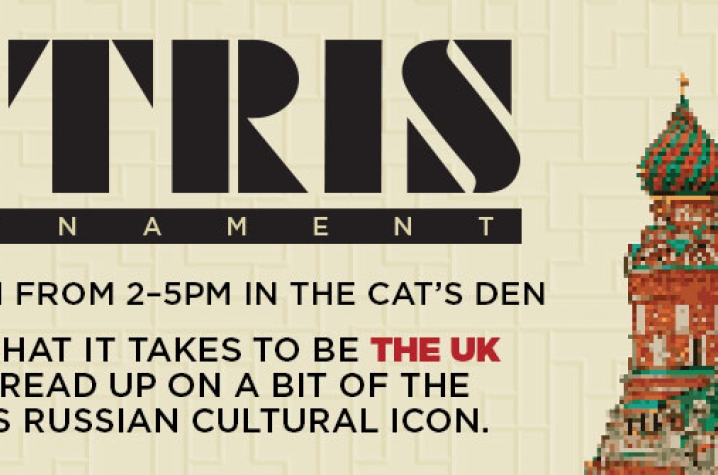A&S Highlights Russian Culture Through Tetris Tournament
LEXINGTON, Ky. (Oct. 31, 2012) — As part of the Reimagining Russia’s Realms initiative, the UK College of Arts and Sciences will offer an opportunity for students to participate in a unique facet of Russian culture — a puzzle that has challenged millions and thwarted solution for more than 25 years: Tetris
A Tetris tournament will pit 32 contestants in a bracket-style elimination challenge, on Thursday, Nov. 1 from 2-5 p.m. in the Cat’s Den at the Student Center.
The tournament is the brainchild of Hive art director Charlie Campbell, who says he has spent hundreds of hours playing the “Russian Mind Game” over the years.
For the uninitiated, Tetris was designed by Alexey Pazhitnov in 1985 and became popularized in America when it was released for the Gameboy and Nintendo Entertainment System in 1989. The history of Tetris is marred with lawsuits and court cases over creative theft, but the game itself is a force that has endured into the new century, selling hundreds of millions of digital copies for cell phones and new gaming platforms.
In spite of its contentious history, for Americans like Campbell, Tetris represented something of an olive branch in otherwise contentious and troubling geopolitical times.
“I suppose most of this is in retrospect, but the nuance of this masterpiece of a game coming from ‘those communists’ had a counter-effect against the media's message of Russia as our national enemy,” Campbell said. "I loved the game, and by extension was curious and respectful of its creators and their culture. Its existence made me question, in a subtle way, the popular American opinion of Russia at the time. Tetris was too good to have come from an enemy.”
Inspired by creator Pazhitnov’s fascination with block-based puzzle games, Tetris challenges players to make horizontal lines using a variety of falling geometric shapes called tetriminos.
But the apparent simplicity of Tetris belies its continued presence in American culture.
“While about clearing a playing field of disorganized mess, it rewards creative thinking. There's not just one way to complete a line, and it's also hard to argue that one solution is better than another,” Campbell explained.
Campbell said that many credit the continued popularity of Tetris on its fiendish simplicity, while others feel that it captures the imagination by doing the opposite of most video games in encouraging constructive instincts. But regardless of the reason for its staying power, Tetris remains distinctly Russian.
“The game is addictive and rewarding, but it had this mysterious air about it. I can recall the music at will. It was a bit spooky, yet futuristic. The design and music were so clearly Russian,” Campbell said.
Students are encouraged to sharpen their skills and come to the Cat’s Dean on Nov. 1 to celebrate the Year of Russia by playing this transcendent product of Russian culture.
A final word of advice: don’t squander the “I”-shaped blocks. Big mistake.
Students can practice before the tournament on the College of Arts and Sciences website: http://www.as.uky.edu/tetris-tournament
MEDIA CONTACT: Sarah Geegan, (859) 257-5365; sarah.geegan@uky.edu






